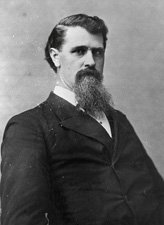James Henderson Berry
| James Henderson Berry | |
|---|---|
 |
|
| 14th Governor of Arkansas | |
|
In office January 13, 1883 – January 17, 1885 |
|
| Preceded by | Thomas James Churchill |
| Succeeded by | Simon Pollard Hughes, Jr. |
|
United States Senator from Arkansas |
|
|
In office March 20, 1885 – March 3, 1907 |
|
| Preceded by | Augustus H. Garland |
| Succeeded by | Jeff Davis |
| Speaker of the Arkansas House of Representatives | |
|
In office 1873 |
|
| Preceded by | Charles W. Tankersley |
| Succeeded by | A. A. Pennington |
| Member of the Arkansas House of Representatives | |
|
In office 1866–1874 |
|
| Personal details | |
| Born | May 15, 1841 Jackson County, Alabama |
| Died | January 30, 1913 (aged 71) Bentonville, Arkansas |
| Political party | Democratic |
| Military service | |
| Service/branch | Confederate States Army |
| Unit | 16th Arkansas Infantry |
| Battles/wars | American Civil War |
James Henderson Berry (May 15, 1841 – January 30, 1913) was a United States Senator and served as the 14th Governor of the State of Arkansas.
Berry was born in Jackson County, Alabama to Isabella Jane (née Orr) and James McFerrin Berry. The family moved to Arkansas in 1848. Berry attended Berryville Academy in Berryville, Arkansas for one year. The Academy was named after his family.
Berry studied law and in 1866 was admitted to the Arkansas bar.
In 1865, Berry married E.Q. "Lizzie" Quaile. They had six children: daughters Nellie Frank, Berl, Jennie, and Bessie; and sons Elliott and Frederick Hugh.
At the outbreak of the American Civil War, Berry joined the Confederate Army and was commissioned as a Second Lieutenant with the 16th Arkansas Infantry Regiment. Berry lost his right leg during the Second Battle of Corinth in northern Mississippi. After recuperating from his wound he worked as a school teacher and started a private law practice.
Berry was elected to the Arkansas House of Representatives in 1866. He was reelected in 1872 and in 1874. In his last term he was selected to be Speaker of the House. Berry was the chairman of the Democratic State Convention in 1876. In 1878 he became a judge for the Fourth Circuit Court and served in that post until 1882 when he was elected Governor of Arkansas.
The Berry administration focused on reducing the state debt and creating a State Mental Hospital. Berry did not run for reelection.
In March 1885, Berry was selected by the legislature to fill the unexpired term of Senator Augustus Hill Garland. Berry remained in the U.S. Senate for the next 22 years. In 1910, he accepted a position with the Arkansas History Commission to mark the graves of all Arkansas Confederate soldiers who had died in northern prisons.
...
Wikipedia
